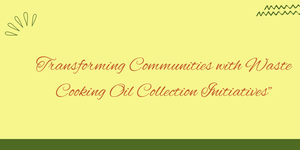-
 Find in Members
Find in Members Find in Videos
Find in Videos Find in Channels
Find in Channels
This website uses cookies to ensure you get the best experience on our website.
To learn more about our privacy policy Click herePrivacy Preference
-
- Last updated November 24, 2023 0 comments, 108 views, 0 likes
More from Mitchel Gail
More in Politics
Related Blogs
Archives
From Frying Pan to Fuel Tank: Transforming Communities with Waste Cooking Oil Collection Initiatives
Body
In a world where sustainability has become a critical concern, innovative initiatives are emerging to address environmental challenges. One such transformative effort is the collection of waste cooking oil, turning a byproduct of our kitchens into a valuable resource. This article explores the journey from frying pan to fuel tank, showcasing how waste cooking oil collection initiatives are making a positive impact on communities and the environment.
The Problem: The improper disposal of has long been a contributor to environmental degradation. When poured down drains or discarded in landfills, it can lead to clogged pipes, water pollution, and harm to aquatic ecosystems. Recognizing this issue, communities are now turning to a more sustainable solution – the collection and recycling of waste cooking oil.
The Collection Process: Waste cooking oil collection initiatives involve the setup of collection points at various locations, including restaurants, households, and community centers. Specially designated containers are provided to efficiently store used cooking oil. These collection points serve as drop-off centers where individuals and businesses can contribute to the initiative, ensuring that the waste oil doesn't end up harming the environment.
Conversion to Biofuel: Once collected, the waste cooking oil undergoes a transformational process. Advanced technologies are employed to convert the used oil into biodiesel, a renewable and environmentally friendly alternative to traditional fossil fuels. This biofuel can be used to power vehicles, machinery, and even for heating purposes. The conversion process not only reduces the environmental impact of waste cooking oil but also contributes to the reduction of greenhouse gas emissions.
Economic and Environmental Benefits: The benefits of waste cooking oil collection initiatives extend beyond environmental concerns. Communities engaging in these programs often experience economic advantages as well. The recycled biodiesel can be used locally, reducing dependence on non-renewable energy sources and creating new economic opportunities within the community.
Moreover, the environmental benefits are substantial. By diverting waste cooking oil from landfills and waterways, these initiatives play a role in preserving ecosystems and mitigating the negative effects of improper disposal. The reduction of carbon emissions through the use of biodiesel further contributes to the fight against climate change.
Community Engagement and Education: The success of waste cooking oil collection initiatives relies heavily on community engagement and education. Awareness campaigns, workshops, and educational programs help inform individuals and businesses about the environmental impact of improper disposal and the benefits of participating in such initiatives. As communities become more informed and involved, the impact of these programs grows exponentially.
Conclusion: From frying pan to fuel tank, Waste Cooking Oil Collectors initiatives are transforming communities by providing a sustainable solution to an age-old problem. These initiatives not only protect the environment but also foster economic growth and community resilience. As more regions embrace this innovative approach, we move one step closer to a more sustainable and eco-friendly future.









Comments